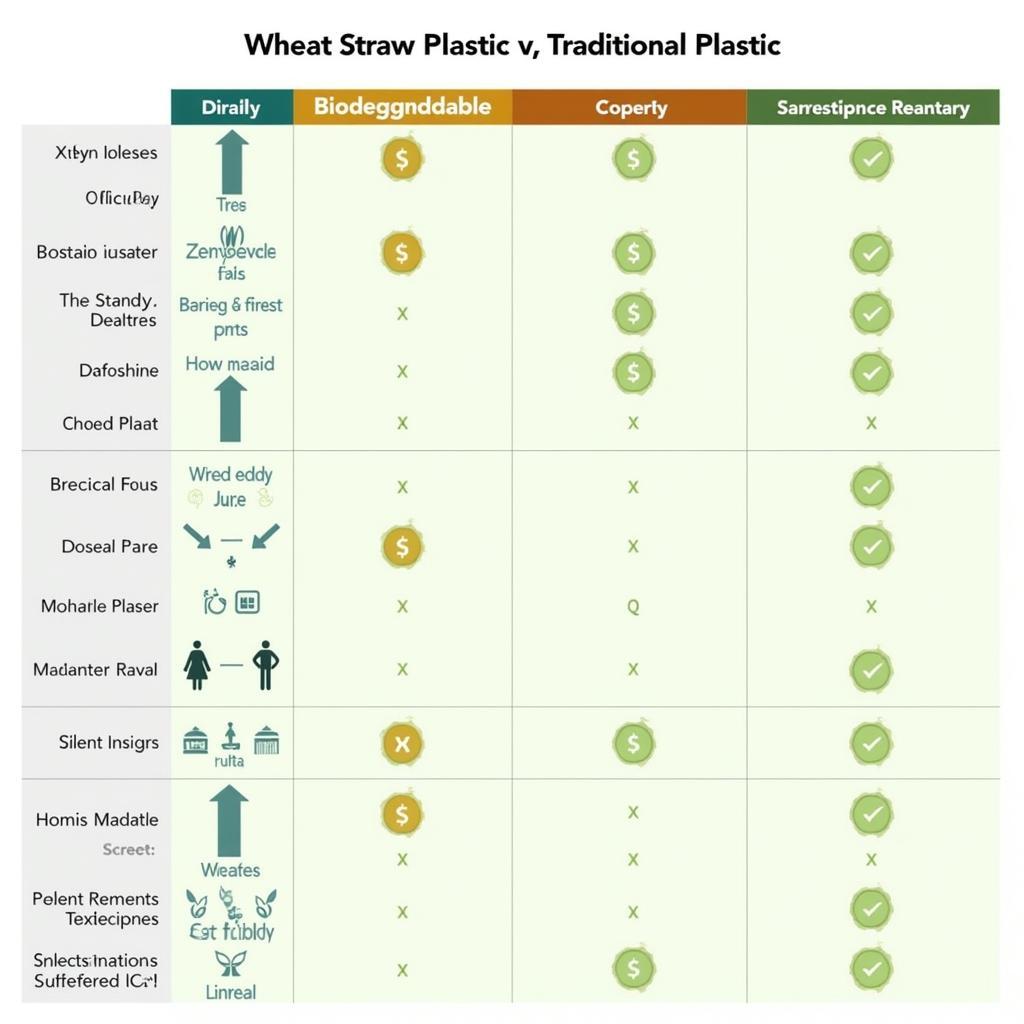Wheat straw plastic is touted as a sustainable alternative to traditional petroleum-based plastics. It promises to reduce our reliance on fossil fuels and minimize plastic waste. But is it truly the eco-friendly solution it claims to be? Let’s delve into the pros and cons of wheat straw plastic to understand its real impact.
The Advantages of Wheat Straw Plastic
Wheat straw plastic offers several compelling benefits, making it an attractive alternative in a world increasingly concerned about plastic pollution.
- Reduced Reliance on Fossil Fuels: Wheat straw, a byproduct of wheat harvesting, replaces a portion of the petroleum typically used in plastic production. This shift towards renewable resources helps lessen our dependence on finite fossil fuels.
- Biodegradable and Compostable (Sometimes): Some wheat straw plastic products are designed to biodegrade under specific composting conditions. This means they can break down into organic matter, reducing landfill waste. However, it’s crucial to verify the specific product’s compostability as not all wheat straw plastics are created equal.
- Lower Carbon Footprint: Utilizing agricultural waste like wheat straw in plastic production can contribute to a lower carbon footprint compared to conventional plastic. This is due to the reduced energy required for production and the carbon sequestration benefits of using a plant-based material.
- Durable and Functional: Wheat straw plastic can be surprisingly durable and functional, suitable for a variety of applications from food containers to tableware. This makes it a viable replacement for traditional plastic in many everyday uses.
 Ứng dụng nhựa rơm lúa
Ứng dụng nhựa rơm lúa
The Disadvantages of Wheat Straw Plastic
Despite the promising advantages, wheat straw plastic also faces several challenges that need consideration.
- Not Always Truly Biodegradable: While marketed as biodegradable, many wheat straw plastic products only decompose under specific industrial composting conditions, not in home compost bins or landfills. This can lead to confusion and improper disposal, ultimately negating the intended environmental benefits.
- Potential for Contamination: The production process for wheat straw plastic can sometimes involve melamine or other additives to enhance its properties. These additives can potentially leach into food or beverages, raising health concerns.
- Limited Durability Compared to Traditional Plastic: While functional, wheat straw plastic may not be as durable as conventional plastic, especially for long-term use or applications requiring high strength and resistance to wear and tear.
- Can Contaminate Recycling Streams: If incorrectly mixed with traditional plastics during recycling, wheat straw plastic can contaminate the recycling process and compromise the quality of recycled materials. This underscores the importance of clear labeling and proper disposal.
Wheat Straw Plastic vs. Traditional Plastic: A Comparison
Choosing between wheat straw plastic and traditional plastic requires careful consideration of their respective strengths and weaknesses.
- Durability: Traditional plastic generally offers superior durability and longevity.
- Biodegradability: Wheat straw plastic has the potential for biodegradability, though this is dependent on specific product composition and composting conditions.
- Cost: Wheat straw plastic can be slightly more expensive than traditional plastic.
- Environmental Impact: Wheat straw plastic generally has a lower environmental impact due to reduced reliance on fossil fuels and potential for biodegradation.
 So sánh nhựa rơm lúa và nhựa thông thường
So sánh nhựa rơm lúa và nhựa thông thường
Conclusion
Wheat straw plastic presents a promising step towards more sustainable plastic alternatives. While it offers significant benefits like reduced reliance on fossil fuels and the potential for biodegradability, it also has limitations regarding its true compostability and potential for contamination. Understanding these pros and cons is crucial to making informed choices and maximizing the environmental benefits of using wheat straw plastic. Remember to always check product labeling for specific disposal instructions.
FAQ
- Is all wheat straw plastic compostable? No, only some are specifically designed for industrial composting.
- Can I recycle wheat straw plastic? It depends on local recycling facilities; check with your local waste management.
- Is wheat straw plastic safe for food contact? Generally yes, but look for products certified as food-safe.
- Is wheat straw plastic more expensive? It can be slightly more expensive than traditional plastic.
- How can I dispose of wheat straw plastic properly? Follow product-specific instructions, which may include composting or specific recycling streams.
- What are the other alternatives to traditional plastic? Other alternatives include bamboo, cornstarch, and seaweed-based plastics.
- How long does wheat straw plastic take to decompose? Decomposition time varies depending on the specific product and composting conditions.
Other questions and articles on our website
- What are bioplastics?
- The future of sustainable packaging
- Eco-friendly alternatives for your home
Kêu gọi hành động: Khi cần hỗ trợ hãy liên hệ Số Điện Thoại: 0909802228, Email: doibongda@gmail.com Hoặc đến địa chỉ: 101 Đ. Lý Chiêu Hoàng, Phường 10, Quận 6, Hồ Chí Minh, Việt Nam. Chúng tôi có đội ngũ chăm sóc khách hàng 24/7.